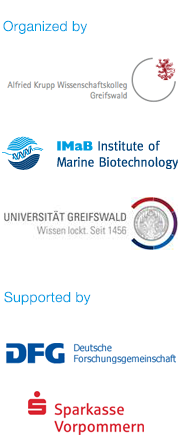Scope of the conference
Marine microorganisms constantly interact with their biotic and abiotic environment. Many even live in intimate associations with other organisms. These interactions are crucial for the propagation and survival of microbes in marine ecosystems and they impact global nutrient cycles. Despite their importance, microbial interactions in marine systems only recently became fully tractable. We are now for the first time able to assess the full microbial diversity of the ocean. Functional analyses are benefitting from the (meta)-omics revolution and novel single cell technologies, to just name two of many new tools.
Polyphasic studies integrating state of the art taxonomic and functional assessments are advancing our understanding of microbial-dominated biogeochemical element cycling. Moreover, the analysis of in situ activities of marine microbial assemblages allows for a cultivation-independent elucidation of cellular processes essential for ecosystem functioning. However, progress in our understanding of interactions continues to be facilitated by the cultivation of marine microorganisms. By detailed functional analyses of cultivable model bacteria, new environmentally relevant metabolic pathways and adaptation strategies can be elucidated. In-depth biochemical characterizations of identified key proteins are required to unravel specific molecular mechanisms and metabolic pathways of distinct key bacterial populations in their natural marine habitats. Comprehensive analyses of both the genomic diversity and activity of marine microorganisms are key to a better understanding of microbial interactions in marine systems.
The second conference on this topic in Greifswald - MIMAS2 - aims at bringing together researchers from such different fields as microbial ecology and structure biology. There will be a focus on trophic interactions (e.g. the utilization of algal polysaccharides by marine bacteria) and marine symbioses. Other topics dealing with microbial interactions in marine systems are also more than welcome.
Objectives of the conference
- Microbial-mediated ecosystem functions and adaptation strategies of marine bacteria
- The physiology of uncultivable marine symbionts
- Ecophysiological interdependencies of bacteria within marine microbial assemblages
- Molecular mechanisms of bacterial degradation of marine polysaccharides
